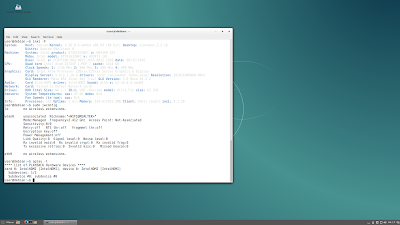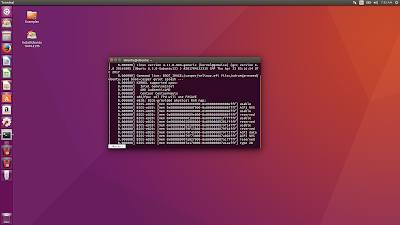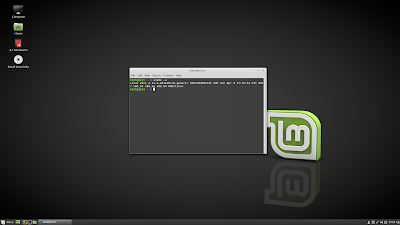Although Debian have released 'Live' ISOs for some time, I've always had problems getting them to boot on Intel Atom Bay Trail and Cherry Trail devices. But with the news of Canonical dropping Unity in favour of Gnome and with the rise in popularity of Linux Mint and their Cinnamon and Mate editions, I thought I'd revisit Debian and see whether my 'isorespin' script could be adapted to make a difference.
After modifying my script to successfully boot a Debian 'Live' ISO (see https://www.debian.org/CD/live for details and http://cdimage.debian.org/debian-cd/current-live/amd64/iso-hybrid for downloadable images) I realised that as the kernel was version 3.16 the original Canonical Intel Atom DKMS packages could be applied to provide HDMI audio and RTL8723BS wifi.
Unfortunately it does mean that the same old problems are back in that HDMI audio only works with a device booting from a 64-bit bootloader (otherwise it is back to DSDT patching for 32-bit devices) and audio is flakey to the point of not being really usable on desktops like LXDE.
However it does mean that LMDE (Linux Mint Debian Edition) gains the critical functionality making it more useable.
At the same time I thought it would be interesting to be able to have a choice in what kernel an Ubuntu based ISO could be respun with. Not only does the Ubuntu Kernel Team release mainline builds but they also provide builds based on the 'drm' sub-tree and have recently (albeit again) included kernels built on 'drm-intel-nightly'. These are particularly useful is seeing what new functionality is further upstream than the mainline release candidate builds.
As well any Ubuntu mainline kernel build can be installed up to the latest release candidate.
I've included all this functionality into a new release of my 'isorespin' script. And as such I've had to change the invocation or syntax for running the script slightly.
The script can be downloaded from isorespin.sh and when executed as a command has new parameters that support both short and long form when defining options. Besides a '-h' or '--help' that shows the syntax and a '-v' or '--version' to display the version, the ISO that you want respun must now be specified by the '-i' or '--iso' flag. The ISO can either be an Ubuntu, Ubuntu flavour, Linux Mint or Debian ISO and can be modified by further options. The '-u' or '--update' flag will update an Ubuntu or Linux Mint ISO with the latest mainline kernel. But when used with a Debian or LMDE ISO it will update the kernel with the Canonical DKMS patches for HDMI audio and RTL8723BS wifi. The '-k' or '--kernel' option is only allowed for Ubuntu and Linux Mint ISOs and any of the Ubuntu Kernel Team kernel builds found at http://kernel.ubuntu.com/~kernel-ppa/mainline can be specified by using the directory/folder name without the trailing '/' (as in '--kernel v4.11-rc6'). Note that the earlier kernels will probably not work well if at all.
For anyone brave enough to try an installation of the non-Ubuntu ISOs you may encounter the usual issues with installing a bootloader. To help I've written an additonal script 'linuxium-install-bootloader.sh' that even if it doesn't work directly, the commands within the script should provide a good enough guide to allow you to install manually. Note that running the script requires an internet connection and the target Linux partition needs to be already mounted on '/target' with the target boot partition mounted on '/target/boot/efi'.
If you like the scripts then please donate using the following link http://goo.gl/nXWSGf as everything helps with development costs.
After modifying my script to successfully boot a Debian 'Live' ISO (see https://www.debian.org/CD/live for details and http://cdimage.debian.org/debian-cd/current-live/amd64/iso-hybrid for downloadable images) I realised that as the kernel was version 3.16 the original Canonical Intel Atom DKMS packages could be applied to provide HDMI audio and RTL8723BS wifi.
Unfortunately it does mean that the same old problems are back in that HDMI audio only works with a device booting from a 64-bit bootloader (otherwise it is back to DSDT patching for 32-bit devices) and audio is flakey to the point of not being really usable on desktops like LXDE.
However it does mean that LMDE (Linux Mint Debian Edition) gains the critical functionality making it more useable.
At the same time I thought it would be interesting to be able to have a choice in what kernel an Ubuntu based ISO could be respun with. Not only does the Ubuntu Kernel Team release mainline builds but they also provide builds based on the 'drm' sub-tree and have recently (albeit again) included kernels built on 'drm-intel-nightly'. These are particularly useful is seeing what new functionality is further upstream than the mainline release candidate builds.
As well any Ubuntu mainline kernel build can be installed up to the latest release candidate.
I've included all this functionality into a new release of my 'isorespin' script. And as such I've had to change the invocation or syntax for running the script slightly.
Usage: ./isorespin.sh [-h|-v] | [-u | -k <kernel>] -i <ISO>
The script can be downloaded from isorespin.sh and when executed as a command has new parameters that support both short and long form when defining options. Besides a '-h' or '--help' that shows the syntax and a '-v' or '--version' to display the version, the ISO that you want respun must now be specified by the '-i' or '--iso' flag. The ISO can either be an Ubuntu, Ubuntu flavour, Linux Mint or Debian ISO and can be modified by further options. The '-u' or '--update' flag will update an Ubuntu or Linux Mint ISO with the latest mainline kernel. But when used with a Debian or LMDE ISO it will update the kernel with the Canonical DKMS patches for HDMI audio and RTL8723BS wifi. The '-k' or '--kernel' option is only allowed for Ubuntu and Linux Mint ISOs and any of the Ubuntu Kernel Team kernel builds found at http://kernel.ubuntu.com/~kernel-ppa/mainline can be specified by using the directory/folder name without the trailing '/' (as in '--kernel v4.11-rc6'). Note that the earlier kernels will probably not work well if at all.
For anyone brave enough to try an installation of the non-Ubuntu ISOs you may encounter the usual issues with installing a bootloader. To help I've written an additonal script 'linuxium-install-bootloader.sh' that even if it doesn't work directly, the commands within the script should provide a good enough guide to allow you to install manually. Note that running the script requires an internet connection and the target Linux partition needs to be already mounted on '/target' with the target boot partition mounted on '/target/boot/efi'.
If you like the scripts then please donate using the following link http://goo.gl/nXWSGf as everything helps with development costs.





